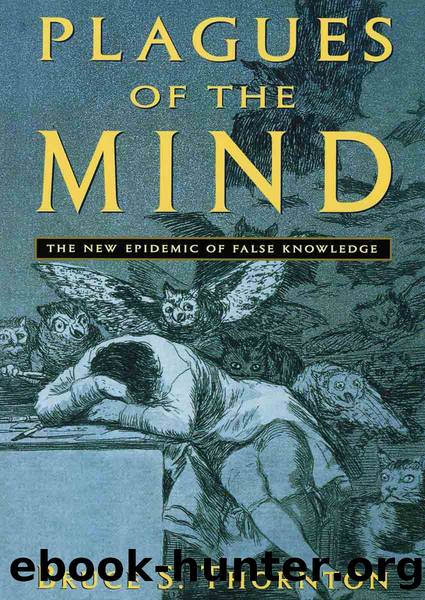Plagues of the Mind: The New Epidemic of False Knowledge by Bruce S Thornton

Author:Bruce S Thornton [Thornton, Bruce S]
Language: eng
Format: epub
Tags: political science, General
ISBN: 9781497648937
Google: AiGDAwAAQBAJ
Publisher: Open Road Media
Published: 2014-05-13T23:49:27.782812+00:00
Weatherfordâs ignorance here is astonishing. The words âdemocracyâ and âlibertyâ are literally derivatives of ancient Greek and Latin rather than of Iroquois, for a simple reason: Ancient Athens invented the idea of democracy as egalitarian rule by all the citizens regardless of birth or wealth. Women were excluded, of course, but then women couldnât serve as Iroquois Council chiefs either, no matter how much they kibbitzed from the sidelines. And it was the Roman Republic, Alexander Hamiltonâs ânurse of freedom,â33 that provided the most important example of a republic defined by representation and the separation of powersâthe ideal âmiddle constitutionâ of a mixed, stable government defined by checks and balances so highly praised by the historian Polybius. The Iroquois League obviously was not a republic, since chiefs were not elected by âcitizensâ as delegates to a political institution. It was the example of republics ancient and modern that animated the Founders. As John Adams said in a letter to Lafayette in 1782, âTwo republican powers, Athens and Rome, have done more honor to our species than all the rest of it. A new country can be planted only by such a government. America would at this moment have been a howling wilderness inhabited only by bears and savages, without such forms of government; and it would again become a wilderness under any other.â34 Such quotations could be multiplied, for the Revolutionary Age saw âthe greatest outpouring of lessons from antiquity in the public arena that America was ever again to witness.â35
As for the âFrench in the eighteenth century,â that is the philosophes, the influence of classical civilization on them is a historical truism bordering on the banal.36 But most important, what Weatherford calls the âlightâ from the âtorch of Indian liberty that still burned brightlyâ when the Europeans arrived (124) dims beside the blaze of freedom ignited by a handful of Greeks on the plains of Marathon, in the passes of Thermopylae, and in the straits of Salamis, as even a casual reading of Herodotus will attest. Centuries before Europeans encountered the New World, the ideal of freedom, so many times nearly extinguished, was kept alive by Europeans in numerous anecdotes from ancient history, such as the reply of some Spartan envoys to the invitation of the Persian Hydarnes to submit to that Great King of Persia: âYou understand well enough what slavery is, but freedom you have never experienced, so you do not know if it tastes sweet or bitter. If you ever did come to experience it, you would advise us to fight for it not with spears only, but with axes too.â37 Likewise, Romans like Cicero and especially Cato Uticensis provided classical models of martyrs to republican freedom; Joseph Addisonâs play Cato was frequently performed and went through eight editions before 1800.38 For Weatherford to dismiss this classical tradition as a âfailed effortâ (even if we, like Weatherford, should ignore the fact that Athenian democracy lasted for nearly two hundred years and the Roman Republic far longer) bespeaks a reprehensible historical obscurantism.
Download
This site does not store any files on its server. We only index and link to content provided by other sites. Please contact the content providers to delete copyright contents if any and email us, we'll remove relevant links or contents immediately.
| Africa | Americas |
| Arctic & Antarctica | Asia |
| Australia & Oceania | Europe |
| Middle East | Russia |
| United States | World |
| Ancient Civilizations | Military |
| Historical Study & Educational Resources |
Machine Learning at Scale with H2O by Gregory Keys | David Whiting(4314)
Never by Ken Follett(3960)
Fairy Tale by Stephen King(3401)
Oathbringer (The Stormlight Archive, Book 3) by Brandon Sanderson(3222)
The Man Who Died Twice by Richard Osman(3082)
Will by Will Smith(2928)
Rationality by Steven Pinker(2369)
Can't Hurt Me: Master Your Mind and Defy the Odds - Clean Edition by David Goggins(2344)
The Dark Hours by Michael Connelly(2312)
Friends, Lovers, and the Big Terrible Thing by Matthew Perry(2234)
The Dawn of Everything: A New History of Humanity by David Graeber & David Wengrow(2213)
Principles for Dealing With the Changing World Order: Why Nations Succeed and Fail by Ray Dalio(2059)
A Short History of War by Jeremy Black(1851)
HBR's 10 Must Reads 2022 by Harvard Business Review(1847)
Go Tell the Bees That I Am Gone by Diana Gabaldon(1758)
A Game of Thrones (The Illustrated Edition) by George R. R. Martin(1751)
Kingdom of Ash by Maas Sarah J(1686)
515945210 by Unknown(1669)
443319537 by Unknown(1562)
